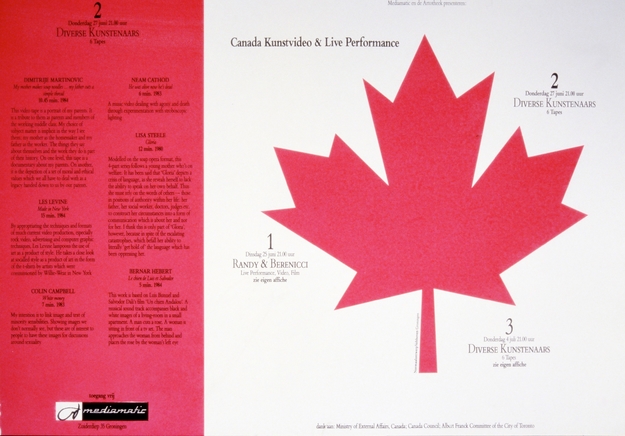DIMITRIJE MARTINOVIC
My mother makes soup noodles ... my father cuts a simple thread
10.45 min. 1984
This video tape is a portrait of my parents. It is a tribute to them as parents and members of the working middle class. My choice of subject matter is implicit in the way I see them; my mother as the homemaker and my father as the worker. The things they say about themselves and the work they do is part of their history. On one level, this tape is a documentary about my parents. On another, it is the depiction of a set of moral and ethical values which we all have to deal with as a legacy handed down to us by our parents.
LES LEVINE
Made in New York
15 min. 1984
By appropriating the techniques and formats of much current video production, especially rock video, advertising and computer graphic techniques, Les Levine lampoons the use of art as a product of style. He takes a close look at so-called style as a product of art win the form of the t-shirts by artists which were commissioned by Willie-Wear in New York.
COLIN CAMPBELL
White money
7 min. 1983
My intention is to link image and text of minority sensibilities. Showing images we don't normally see, but these are of interest to people to have these images for discussions around sexuality.
NEAM CATHOD
He was alive now he's dead
6 min. 1983
A music video dealing with agony and death through experimentation with stroboscopic lighting.
LISA STEELE
Gloria
12 min. 1980
Modelled on the soap opera format, this 4-part series follows a young mother who's on welfare. It has been said that 'Gloria' depicts a crisis of language, as she reveals herself to lack the ability to speak on her own behalf. Thus she must rely on the words of others - those in positions of authority within her life: her father, her social worker, doctors, judges etc. to construct her circumstances into a form of communication which is about her and not for her. I think this is only part of 'Gloria', however, because in spite of the escalating catastrophes, which befall her ability to literally 'get hold of' the language which has been oppressing her.
BERNAR HEBERT
Le chien de Luis et Salvador
5 min. 1984
This work is based on Luis Bunuel and Salvador Dali's film 'Un chien Andalou'. A musical sound track accompanies black and white images of a living-room in a small apartment. A man cuts a rose. A woman is sitting in front of a tv set. The man approaches the woman from behind and places the rose by the woman's left eye.
dank aan: Ministry of External Affairs, Canada; Canada Council; Albert Franck Committee of the City of Toronto
